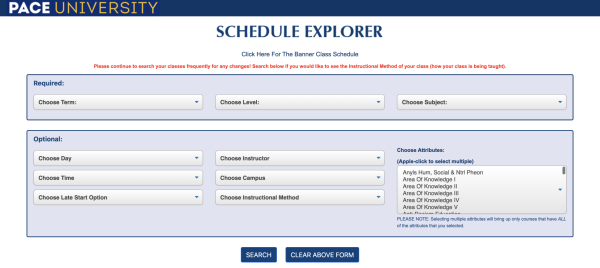
Welcome to Pace University, new and returning Setters! Now that we have all had a nice, relaxing summer vacation, it’s time to get back into the swing of things and head back to the aspect of college you all dread or love: classes.
A big factor in attending higher education is being able to choose what courses you want to take (with some limitations) and interact with other peers and instructors who are experts in that field. However, classes have changed in the past few years, thus altering the “college experience” quite a bit. Some students who were still in high school when Covid-19 first hit are still being affected in college by their means of learning. This guide will give tips and information on classes at Pace, not by subject, but by instructional method(s).
The “Schedule Explorer” tool is accessible by going to your student portal, which provides all the available instructional methods for any class you’re considering, or you can access it with this link: https://appsrv.pace.edu/ScheduleExplorer/
In Person (a.k.a. ONCMP – short for “on-campus”): As the title suggests, this class is where you, your peers, and your professor will interact in a physical environment. Attendance is not always mandatory for these classes, but it is highly recommended as the professor might give crucial information; it’s your decision if you choose to go or not, as nobody is forcing you. If you do, you won’t have to worry about contacting one of your classmates to get any notes you might have missed.
Web-Assisted (WA): This class is just like any in-person class, except you will learn online some days. This can happen due to many factors (the professor could be stuck at home, your classroom is undergoing repairs, etc.). You will be expected to attend whichever way the class is taught that day. Pace has study rooms, libraries, and many other areas to set up your laptop and get to work, if you don’t have a private space at that time.
Hybrid-Flex (HYFLX): Classes are simultaneously held in-person and online; they are not one or the other as capacity restrictions can occur. When registering for classes, there’s only so much room and space available that the professor can only teach so many people at once.
Synchronous (SYNC): Classes with this label are a fancy way for saying students and the professor meet online, with the latter providing instruction in real-time via video conferencing apps (i.e. Zoom). For all the Covid-era high schoolers out there, remembering having to deal with six-plus hours of consecutive virtual meetings, it’s not like that in college. Most people only take two or three classes a day that meet one to three times a week, depending on their length.
Asynchronous (ASYNC): For these classes, you participate and complete assignments on your own time with a professor providing assignments, and you turn them in via Brightspace, unless told an alternative. However, there are deadlines for assignments; the idea is that you split up the work in the time you must complete the assignment(s). You must know when everything’s due as a syllabus will be provided.
Mixed (MIXAS): This is a combination of the asynchronous and synchronous methods; some days you will be able to interact with your professor, while on others, you will work at your own pace (no pun intended). Like any asynchronous class, you must know crucial due dates.
Be mindful of what classes to apply for as well, it can get tricky with credits and where they apply, depending on past credits. If, for example, you have taken an art class, and it applies to your AOK4, it’ll fulfill an AOK4 credit. However, in a later semester, if you decide to take a second art class with the same AOK, it won’t apply to your AOK4 due to the similarities, and it will be sent to unassigned credits. The moral is to make sure you read your degree works page very carefully.
If you are ever concerned or worried about this matter, remember you are never alone! You can schedule a meeting with your advisor, speak to fellow peers, speak to your professors, and more, everyone is in the same boat! Classes aren’t meant to be scary or intimidating, even if the process really feels that way. We have all been there, but it always works out in the end, so let’s have a fun and productive fall semester this year!

